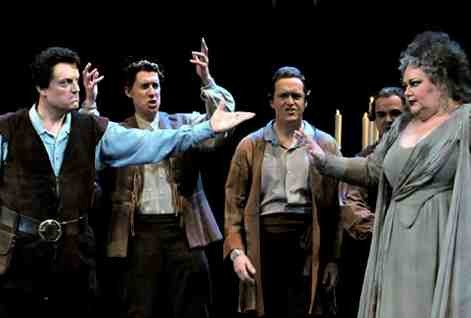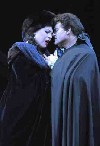Verdi at Chicago's Lyric Opera
Megawattage Singing in The Masked Ball
By: Susan Hall - Nov 19, 2010
A Masked Ball
by Giuseppe Verdi
The Lyric Opera of Chicago
November 18, 2010
Stage Direction by Renata Scotto
Conducted by Asher Fisch
Cast (in order of appearance)
King Gustavus III, Frank Lopardo
Oscar, Kathleen Kim
Count Anckarstrom, Mark Delevan
Fortuneteller, Stephanie Blythe
Amelia, Sondra Radvanovsky
Photos Dan Rest/ courtesy Lyric Opera of Chicago
The Lyric Opera of Chicago has mounted a conventional and highly satisfying production of A Masked Ball by Verdi. The premier production of this opera was set in Boston of all places. This is Verdi’s Massachusetts opera.
We are in Stockholm this time, the location of the play on which the opera is based. Italian censors busily noted that in the mid 19th century adversaries could not kill monarchs on stage. It might incite assassins. To satisfy the censors the opera was reset in Stettin, the capital of West Pomerania. But an assassination attempt was made on Napoleon the III shortly before the scheduled premier, and only relocating the opera to the New World made an Italian premier possible.
Boston it was and the King becomes the Count of Boston.
Times have changed. Kings have by and large disappeared or been mineralized. No one would think of stabbing England’s sweet Queen. So back we are in Stockholm.
When the three principals stand and deliver in Aida, against a background of pyramids and parades, movement and interaction don’t seem necessary. But this is not true of A Masked Ball, in which illicit love, jealousy, fateful fortune telling, loyalty and a mother’s anguish are all in play. We need interaction and don’t get it here. Renata Scotto, the wonderful soprano who often played Amelia in A Masked Ball, doesn't make the director's cut.
Despite the oddly static staging and masked emotions, we are treated to an evening of glorious sound. It is rare to have on stage one of the few performers in any era who has been blessed with a huge, and hugely beautiful voice. In Masked Ball we are treated to two forces of nature.
Stephanie Blythe makes her Lyric debut as the Fortuneteller. Her clear, lush mezzo wrapped around the role, which she colored with an unusual, but deeply satisfying dark side. Blythe is formidable, with a commanding dynamic range and a musical intelligence that unleashes her incredible instrument to almost superhuman beauty and size. She is also a consummate actress, who simply inhabits a role and her performance was completely convincing.
Like Blythe in scope and range, the soprano Sondra Radvanovsky is huge of voice and dynamic possibility. The Lyric has cast her in Ernani, Carlisle Floyd’s Susanna and Il Trovatore. She traveled with Trovatore when it transferred to New York, and wowed Met audiences, but for inexplicable reasons, the powerful duo of the Met’s general manager and the lead New York Times classical music reviewer put her down whenever they could. Placido Domingo insisted that she be on the Met roster, rightly recognizing Radvanovsky as the leading interpreter of Verdi in our day. (Domingo has been willing to hire the Met general manager’s wife to conduct in his various opera companies, so he has clout.)
Radvanovsky is a beautiful Amelia, full of feeling. Her dynamic range from a whisper to a full blown cry is remarkable and in full control. Her anguish is palpable, but always expressed musically, which makes her such a satisfying performer.
On the face of it casting Frank Lopardo as the King was a way to provide a solid center to the production. Even though his performance on Thursday was prefaced by an announcement that he had stomach flu, Lopardo was much more than rock solid. If this is a Lopardo handicapped, one wishes to hear him set free. His lovely lyricism had a spinto edge which seared through the orchestra. He was very much Radvanovsky’s match. (We have seen male superstars totally swamped by this extraordinary soprano. She is generous, but her voice naturally would fill the Roman Coliseum).
Mark Delevan, the presumptively cuckolded husband and good friend to the King, seemed put off by his stage direction. Early in the drama, he must have been told to make nice which was too flat and dull a posture. Once he got murder in mind, his singing burst forth in the burly, yet tender lyricism which has been heard in roles ranging from Wotan to Falstaff. His “Eri tu che macchiavi” was wrenching.
Kathleen Kim, heard earlier this year as Zerbinetta, has a lovely, light voice, but her over the top takes on her roles is off-putting and she can be easily discounted despite the delightful, light voice and the exuberant acting.
The direction unfortunately emphasized the improbability of certain plot elements. Going home from the moors where the fortuneteller has located magic herbs to cure mistaken love, a veiled Amelia is escorted by her husband who doesn’t know her. The scene is like Orpheus’ ascent from hell guiding Eurydice who he is not allowed to look at or speak to. When he does, Eurydice dies again, but deus ex machina intervenes and despite disobedience to the rules, Eurydice can return to earth.
In A Masked Ball things don’t turn out so well. The Count unmasks his wife and doom sets in. We can see through Amelia’s veil and it’s hard to imagine that her husband doesn’t see her from the start of their walk home.
Asher Fisch’s direction of the orchestra was magnificent. He embraced the range of Verdi’s expression from the light, lyric lines to the startling, richly textured drama.
Marred only minimally by misdirection, this is an evening of singing not to be missed. Accessible, beautiful, moving. Verdi’s music was presented at its most glorious.



